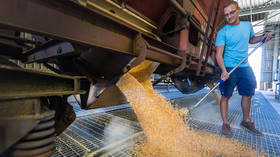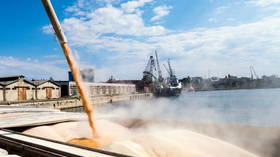Eastern Europe ‘drowning’ in Ukrainian grain – Le Figaro

Anger is mounting across Eastern Europe as farmers in the region protest a glut of cheap grain from Ukraine threatening their businesses, Le Figaro reported earlier this week.
Struggling to sell their crops, producers in Poland, Romania, and Bulgaria have suffered substantial losses due to the surge in imports from Ukraine.
Farmers in nations that had previously agreed to help get grain out of Ukraine and on to global markets now face unfair competition, they say. They also are not subject to the same regulatory requirements.
Last May, the European Union suspended customs duties on all agricultural produce imported from Ukraine for one year to support the economy of the war-torn nation. However, grains and other produce leaving Ukraine settled in the EU instead of being sent outside the bloc, putting competitive pressure on domestic production.
“Instead of going to international markets, to Africa, as politicians promised us, Ukrainian cereals remained in Poland,” Polish farmer Marcin Misiak told the media, adding that his regular buyers opted to purchase cheaper maize from Ukraine.
According to Misiak, he could sell wheat for €340 per ton in August 2022, but at the beginning of March 2023, it cost just €220.
“The EU was unable to anticipate the rapid effects of competition from Ukrainian grains,” said Sebastien Abis, a researcher at the French Institute for International and Strategic Affairs (IRIS) and director of the Demeter Club think tank, as cited by Le Figaro.
“Ukrainian operators did everything to monetize the situation. In European ports, competition was fierce and produce imported from Ukraine would have been favored.”
Last month, the European Commission announced plans to provide financial support to farmers from member-states neighboring Ukraine to compensate for their losses and limit the impact of market imbalances. Brussels tapped a crisis reserve totaling €56.3 million, financed from the Common Agricultural Policy (CAP).
For more stories on economy & finance visit RT's business section













